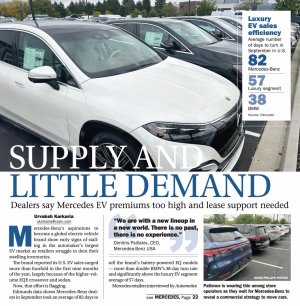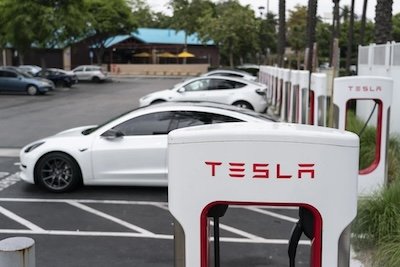 Link to the Automotive News article - behind a paywall so I CnP'd it below. Also, being in the Mercedes-Benz dealer world, I can attest to everything in this article.
Despite Mercedes' zeal for EVs, models are slow to sell
Link to the Automotive News article - behind a paywall so I CnP'd it below. Also, being in the Mercedes-Benz dealer world, I can attest to everything in this article.
Despite Mercedes' zeal for EVs, models are slow to sell
Mercedes dealers took an average of 82 days to sell the brand's battery-powered EQ models in September — more than double that of BMW's 38-day turn.
Mercedes-Benz's aspirations to become a global electric vehicle brand show early signs of stalling in the automaker's largest EV market as retailers struggle to dent their swelling inventories. The brand reported its U.S. EV sales surged more than fourfold in the first nine months of the year, largely because of the higher-volume EQE crossover and sedan.
Now, that effort is flagging.
Edmunds data shows
Mercedes-Benz dealers in September took an average of 82 days to sell the brand's battery-powered EQ models — more than double BMW's 38-day turn rate and significantly above the luxury segment average of 57 days. Mercedes retailers interviewed by
Automotive News blame their bloated stockpiles on the product and on the brand's unwillingness to respond to increased competition with sales programs.
The dealers requested not to be identified for fear of retaliation.
One Midwest retailer said he has a more than six-month supply of EVs compared with about a 50-day supply of gasoline-powered vehicles.
"The EVs are coming whether or not you asked for them or earned them," the dealer said.
"There is too much of a price premium — especially at the top end of the EQ lineup — and almost no [lease] support."
He said the EVs lack the
"lust factor" of Mercedes' gasoline-powered flagship models, such as the S-Class sedan and AMG-GT coupe.
"Our cars need to be 'want' cars," the dealer said. "The S-Class has maintained good loyalty because it's aspirational.
An EQS is not something that most people aspire to own."
Mercedes is responding to the discontent. Executives acknowledge an oversupply of the top-line EQS at the expense of the more affordable EQB and EQE crossovers, a retail source briefed on the matter said. The automaker plans to slow production of higher-end EQ variants while dialing up allocations of lower-priced EVs, plug-in hybrid and full-combustion engine vehicles, the source said, noting retailers should see a difference in inventory by mid-next year.
A Mercedes spokesperson declined to comment on discussions with retailers.
Mercedes U.S. boss Dimitris Psillakis attributes sluggish EV sales to product mix and growing pains in an uncharted segment. "We are with a new lineup in a new world," Psillakis told
Automotive News. "There is no past, there is no experience" with EVs, he said. Supply chain hang-ups, meanwhile, have affected the electric product mix on dealership lots.
"We still face challenges around our product lines and have some restrictions coming from suppliers," Psillakis said.
"We don't always get the volume we want when we want it."
That's kept some more affordable, faster-selling electric models, such as the compact EQB, from reaching dealership lots.
"We could not supply [the EQB] at the beginning of the year," Psillakis said. "Now we can, but it takes some time" to reach retailers.
Ticking clock
Mercedes is not alone in its predicament with EVs. Inventories are surging industrywide as automakers introduce new models and ramp up production to meet stricter federal emission mandates for the years ahead. "The
Biden administration has called for EV share to hit 67 percent by 2032, which is an Apollo moonshot-level undertaking for the auto industry," said Rick Wainschel, a vice president at data analytics firm Cloud Theory in Grand Rapids, Mich.
On Thursday, Cloud Theory released a report showing the average EV sold after 36 days on a dealership lot in early 2023. As of September, that
turn rate had more than doubled to 80 days.
For the luxury segment, the average time it took to sell an EV rose 73 percent in September compared with a year earlier, Edmunds data shows. But for Mercedes retailers, that rate ballooned 110 percent from the prior year. "The ship of early adopters — willing to put a reservation down on virtually any EV announced — has sailed," said Ivan Drury, Edmunds' director of insights.
Drury said that brands and their retailers must now convince skeptics and nonbelievers to switch to EVs — which will take time and financial incentives. Rising interest rates and inflation are also testing the limits of luxury customers' spending elasticity. Sales of Mercedes' flagship electric EQS sedan tumbled 35 percent in the third quarter from a year earlier. The 2023 EQS sedan starts at $105,550 including shipping.
"Electrification — we're all eager for it," Perry Itzcovitch, dealer principal of Mercedes-Benz Downtown in Calgary, Alberta, told
Automotive News Canadain June. "But people are value-conscious. Interest rates have gone up, and people are a little tighter" with their money.
Psillakis said Mercedes needs "time to find the pace and to match equally — demand to supply." However, the executive and his management team have limited runway to find that pace.
At a meeting with North American dealers in Vancouver, British Columbia, in mid-May, Mercedes-Benz global sales and marketing chief Britta Seeger said the company expected EVs to account for 40 percent of new-car sales in the U.S. by 2026 and 70 percent by 2030, according to retailers.
But for the first nine months of 2023, Mercedes said EVs accounted for 14.1 percent of its U.S. sales. Psillakis said he expected that figure to climb as Mercedes brings out electric versions of higher-volume models, such as the CLA sedan and GLC crossover. "The demand for electric vehicles is growing," Psillakis said, citing the 7.9 percent adoption rate nationwide in the third quarter, according to Cox Automotive.
But whether Mercedes meets the EV volume target by 2026, "or if this is moving half a year or a full year later, it's well ahead of us to be able to make a clear prediction of percentage," he said.
Beyond America
Mercedes' global EV ambitions are at risk as it also struggles for traction in China, the world's biggest car market. The German automaker failed to crack the top 10 bestselling EVs priced above $41,000 in China in the first nine months of the year, according to insurance registration and other public data posted by EV brand Zeekr. The EQE sedan came in 11th with 6,200 vehicles sold, followed by the EQB crossover with 5,400.
Lei Xing, co-host of the podcast "China EVs & More" and former chief editor of
China Auto Review magazine, said third-party registration data shows Mercedes sells a "couple of thousand" EQ vehicles a month, compared with more than 10,000 a month for Chinese luxury EV makers such as Geely-owned Zeekr.
Xing said that foreign premium legacy automakers face a competitive onslaught from private and state-owned premium Chinese EV-only brands. "These startups are quicker in technology adoption, speed to market — and deliver more bang for the buck," he said. "That's forcing the foreign premiums into a corner."
Dealer squeeze
In the U.S., Psillakis' plea for patience isn't resonating with some retailers who say bloated EV inventories are siphoning their profits.
A Mercedes store executive said 65 percent of allocation is now EVs. And they are piling up. He reported a 60- to 90-day supply of EQs compared with fewer than 20 days' supply of gasoline-powered vehicles. And with interest rates hovering at 7 to 8 percent, floorplan expense on EV stock is three times higher than for gasoline-powered stock.
"That eats your lunch," he said. "When I sell the car, I'm lucky if I make $750 on the deal."
To reduce supply, the Midwest dealer discounts EQs by more than 15 percent after applying factory rebates and incentives. "If you sneeze in the direction of [an EV], we will make a deal," he said. Dealers said the factory — not them — should handle discounting to help sell EQs.
"We need [incentive] programs and subvention," one retailer said. "We can't correct the pricing mistake by giving away all our gross profit and then some." Lack of factory support could also be hurting a growth engine for the brand — leasing. Edmunds data shows Mercedes had 43 percent EV lease penetration in September, just over half of BMW's 80 percent and much lower than the segment average of 73 percent.
Retailers say they would like Mercedes to lower the lease rate on EQ models rather than cut the sticker price, which would affect the residual value. Mercedes is "working on programs for the EQS," a source said. "EQS is the one everyone is having a hard time moving."
Psillakis declined to reveal a commercial plan but defended the brand's premium pricing. "Mercedes-Benz is a luxury brand," he said. "Our average MSRP is not comparable to other brands." Vehicles with a $100,000-plus sticker price account for nearly 20 percent of the brand's volume, he said. Mercedes reported top-end segment sales, including gasoline-powered S-Class, AMG and Maybach models, rose 11 percent in the third quarter compared with a year earlier.
"Our strategy is to offer pure ICE products, plug-in hybrids ... and full battery-electric vehicles," Psillakis said. "We're one place with many offers for our dealers and for our customers for whatever the demand is."









